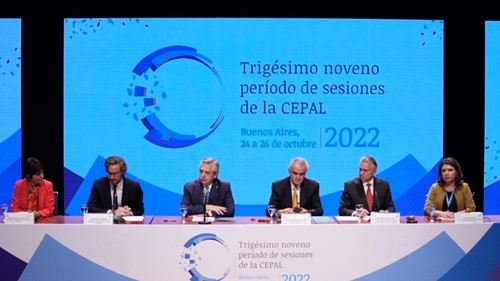
Ministers of Foreign Affairs and high-level authorities of Latin American and Caribbean countries, together with political figures from outside the region, agreed on the urgent need to consolidate efforts and spaces to move towards an integration that will allow the region to speak with a single voice on the global stage and lay the foundations for a transformative reconstruction with a view to a new style of development.
On the closing day of the thirty-ninth session of the Economic Commission for Latin America and the Caribbean (ECLAC), which took place from Monday 24 to Wednesday 26 October in Buenos Aires, Argentina, the authorities reaffirmed ECLAC as a promoter of a rigorous and analytical dialogue where all the voices of the region converge.
The meeting was chaired by Santiago Cafiero, Minister of Foreign Affairs, International Trade and Worship of Argentina, which holds the Presidency of ECLAC. Speakers included José Manuel Salazar-Xirinachs, Executive Secretary of the United Nations Regional Commission; and Josep Borrell, High Representative for Foreign Affairs and Security Policy of the European Union and Vice-President of the European Commission.
Also participating in the dialogue of foreign ministers and high authorities were the ministers of Bahamas, Frederick Mitchell; Bolivia, Rogelio Mayta; Chile, Antonia Urrejola; Costa Rica, Arnoldo Andre Tinoco; Cuba, Rodrigo Malmierca; Ecuador, Juan Carlos Holguín; El Salvador, Alexandra Hill; Guatemala, Mario Búcaro; Honduras, Eduardo Enrique Reina; Jamaica, Kamina Johnson Smith; Nicaragua, Denis Moncada; Panama, Janaina Tewaney; Paraguay, Julio César Arriola; Peru, Cesar Landa; St Vincent and the Grenadines, Keisal Peters; Suriname, Albert Ramdin; and Venezuela, Carlos Faría Tortosa.
The Spanish Minister of Foreign Affairs, European Union and Cooperation, José Manuel Albares, as well as nine Vice-Ministers and high-level representatives from countries in the region and beyond, also took the floor.
“ECLAC has been and must continue to be the place where we are able to bring important and difficult conversations to the table,” José Manuel Salazar-Xirinachs said during his speech.
He added that in Latin America and the Caribbean “we must be capable of developing multilateral and multi-stakeholder dialogues that allow us to listen with careful respect to the diverse visions that coexist in the region and, as a result, build regional consensus that will allow us to lay the foundations for shared diagnoses and public policy proposals that are sustainable over time.”
“Of course we must mitigate the damage, such as the increase in poverty, informality and inequality, and confront the educational blackout, but we must also promote transformative actions for development, so that the countries in the region move forward, manage to get out of the middle-income trap and fulfil the legitimate dream of being socially inclusive countries based on dynamic, sustained, sustainable and inclusive growth,” Salazar-Xirinachs added.
For his part, the Foreign Minister of Argentina, Santiago Cafiero, stressed that the enormous challenges facing Latin America and the Caribbean are based on historical inequality gaps in the region, production, and gender gaps, which are added to the current problems.
“The dialogue we are holding today not only enriches the debate, but also, fundamentally, the projections for finding the path that will take our continent towards human and economic development, with social justice,” the Minister stressed.
He added that the road map proposed by ECLAC in its position paper entitled Towards the transformation of the development model in Latin America and the Caribbean: production, inclusion and sustainability, “could not be timelier.”
“Latin Americans and Caribbeans have the tools to overcome this situation. We have the tools to generate the necessary knowledge to overcome all the vicissitudes in our continent. That is why I congratulate the work that ECLAC has historically carried out. ECLAC was never a technocratic body, it always had life, soul, spirit and challenged itself in the most stressful situations,” he said.
Josep Borrell, High Representative for Foreign Affairs and Security Policy of the European Union and Vice-President of the European Commission, for his part, expressed his interest in relaunching and renewing the relationship with Latin America and the Caribbean.
“I would like to deliver a message to you in these turbulent times, in the face of a world geopolitics seriously altered by Russia’s war against Ukraine: this is an appropriate moment to relaunch more than ever the relationship between Latin America and the Caribbean and the European Union. For the European Union, relaunching and renewing this relationship is a budgetary and priority task,” he said.
